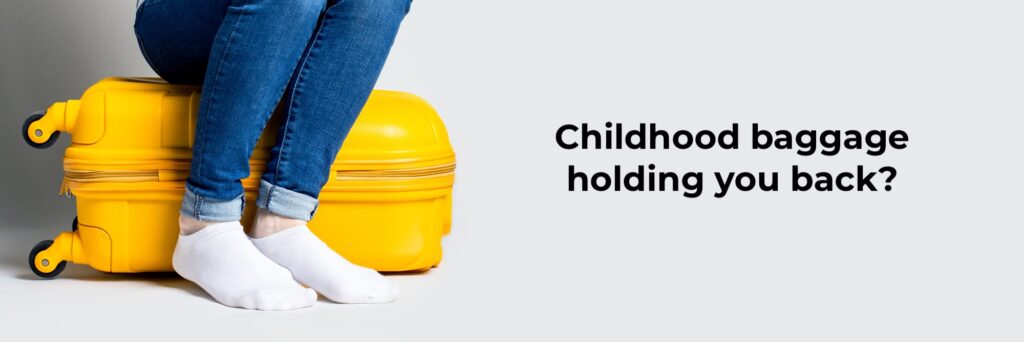
How To Flip The Script on Childhood Baggage That’s Holding You Back – Part 1 of 2
Share viaWe all carry baggage from our childhood that influences our patterns of thinking, feeling, and behaving in the present. Although we can’t spend our lives blaming childhood baggage for every bad decision we make, we can become more aware of it and be more intentional about how we correct it.
Childhood Baggage and Mindset
Dr. James Doty, founder of the Stanford Center for Compassion and Altruism Research and Education, believes there are neuroscience-based practices we can apply to help ourselves. His research is published in his latest book, Mind Magic: The Neuroscience of Manifestation and How It Changes Everything.
In a recent interview for Forbes Magazine, Doty summarizes it this way,
You may not be aware of it, but you are already manifesting previously held intentions, whether the results are what you currently prefer or not. So it doesn’t make sense to leave your mindset on autopilot to affect your future in some unintended way. You have immense power within yourself, by mind-training, to change your circumstance.
Doty suggests four steps to taking back control over your baggage. Be intentionally present, practice optimism, take care of yourself, and train better brain habits.
How To Identify Childhood Baggage
The Process Communication Model® is an effective and accurate tool for identifying dysfunctional childhood habits of thinking, feeling, and behaving, becoming more intentional, and re-training our brains toward a more healthy approach. We’ve been helping adults apply PCM to re-train their brains and behaviors for 20 years.
The power of PCM lies in its ability to identify childhood baggage by analyzing how people communicate. Yes, the structure of our sentences reveals more than you can imagine about little glitches that are holding you back.
Neural Pathways And Communication
Neural pathways are habits of thinking, feeling, and behaving that get reinforced through repetition. Just like the path your dog wears in the lawn by running the same route over and over again, so are the neural pathways that reveal our childhood baggage. Every time we communicate, we are reinforcing a mindset about ourselves and others. The key to change is becoming aware of these patterns and replacing them with more functional habits.
Six Scripts That Reveal Childhood Baggage, And How to Flip the Script for a Healthy Mindset
PCM identifies six patterns of dysfunctional thinking, feeling, and behaving. Called Drivers in PCM, these subtle, but detectable patterns of communication, are like scripts that are reinforced in childhood and can manifest throughout life.
Please You
The baggage: “I need to please others to be OK.”
Sentence structure: Starting sentences with phrases like “Maybe” or “If it’s OK with you,” not asking directly for what you want, over-adapting for others.
Examples: “Maybe we could take a break?” “If it’s OK with you, I’d like to share something.”
Problems it causes in life: Can’t make tough decisions, gets taken advantage of, feels less-than, isn’t assertive when it counts.
Flip the script with optimistic, healthy self-affirmations: “My feelings, thoughts, and ideas are also important. It’s OK to ask for what I want. How people respond to me doesn’t define me.”
Be Perfect for You
The baggage: “I need to be perfect to be OK.”
Sentence structure: Overcomplicated statements with excessive qualifiers, justifications, and rationalizations.
Examples: “I was thinking, considering the data we just looked at, if we were to cross-analyze it…” “I’ve looked at the options, and considered the pros and cons of each, which I have put into this spreadsheet, bearing in mind there are other ways to look at it.”
Problems it causes in life: Wastes time, inefficient, readers and listeners stop paying attention, constant feelings of pressure.
Flip the script with optimistic, healthy self-affirmations: “My thinking and ideas are good as they are. I don’t have to be in control of what people think of me. When I stop talking and let others ask questions, then I can be the most helpful.”
Try Hard for You
The baggage: “I need to try hard to be OK.”
Sentence structure: Expressing confusion with phrases like, “I don’t get it,” or “What?”
Examples: “I don’t get it.” “What was I supposed to do?” “Huh? What?”
Problems it causes in life: Appears as though you don’t care or lack intelligence, invites others to jump in, which restricts your independence, avoids responsibility, doesn’t get you the help you might need.
Flip the script with optimistic, healthy self-affirmations: “I am creative and a great problem-solver.” “I can ask for what I need to regain my independence.” “When I take the first step, others don’t need to impose boundaries on me.”
These are three of the six scripts. Which one best describes you? If you don’t find one, tune in to my future blog posts for the next three scripts.
 There’s an assessment that can identify your childhood baggage, your unhealthy scripts, and how you can turn things around to be the best version of yourself today. Try it today and get a personalized debrief with a certified PCM coach.
There’s an assessment that can identify your childhood baggage, your unhealthy scripts, and how you can turn things around to be the best version of yourself today. Try it today and get a personalized debrief with a certified PCM coach.
Our PCM training programs help leaders identify their predictable patterns of communication behavior, leverage their strengths, adjust dysfunctional habits, and adapt communication to help others do the same. Our clients say they’ve never seen anything else like it.
Want to dive deeper on your own? Get our book about PCM.
Copyright Next Element Consulting, LLC 2024
PCM Can Help You Overcome Childhood Baggage
Book Your Next Keynote Speaker

Author and Co-founder of Next Element, Dr. Nate Regier is available to speak at your upcoming event.
Submit a Speaker RequestListen to Nate on The Compassionate Accountability Podcast
 Listen to the Podcast
Listen to the Podcast

0 Comments
Add comment